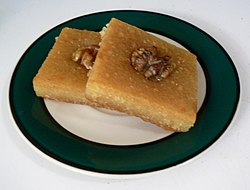| Revision as of 23:49, 18 July 2014 editAcidSnow (talk | contribs)Extended confirmed users7,170 edits fmtting, originated in Somalia← Previous edit | Revision as of 18:20, 19 July 2014 edit undoMiddayexpress (talk | contribs)109,244 edits formatNext edit → | ||
| Line 14: | Line 14: | ||
| | calories = | | calories = | ||
| | other = | | other = | ||
| ⚫ | }}'''Basbousa''' ({{lang-so|Basbuusa}}, {{lang-tr|revani/ravani}}, {{lang-ar|بسبوسة }}) is a traditional ] sweet cake.<ref name="origins">{{cite web|url=http://books.google.com/books?id=FJxlWwrVcKcC&printsec=frontcover#v=onepage&q&f=false |title=The Recipes of Africa |page=241 |date= |accessdate=2014-07-18}}</ref> It is made of cooked ] or ] soaked in ]. Coconut is a popular addition. The syrup may also optionally contain orange flower water or ]. Other than ] and neighboring counties, it is also eaten in the former countries of the ]. | ||
| }} | |||
| ⚫ | ]]] | ||
| ⚫ | '''Basbousa''' ({{lang-so|Basbuusa}}, {{lang-tr|revani/ravani}}, {{lang-ar|بسبوسة }}) is a traditional ] sweet cake.<ref name="origins">{{cite web|url=http://books.google.com/books?id=FJxlWwrVcKcC&printsec=frontcover#v=onepage&q&f=false |title=The Recipes of Africa |page=241 |date= |accessdate=2014-07-18}}</ref> It is made of cooked ] or ] soaked in ]. Coconut is a popular addition. The syrup may also optionally contain orange flower water or ]. Other than ] and neighboring counties, it is also eaten in the former countries of the ]. | ||
| ==Names== | ==Names== | ||
| ⚫ | ]]] | ||
| Basbousa has many regional and ] names: ] بسبوسة ''basbūsah'', هريسة ''harīsa'', ''nammoura'' (in ]<ref>{{cite web|url=http://www.tasteofbeirut.com/2014/07/citrus-bars-nammoura/ |title=Taste of Beirut: Citrus muffins (Nammoura) |accessdate=2014-07-18}}</ref>), ] Շամալի '''shamali''', ] '''revani/revani''' (from ]<ref>{{cite web|url=http://www.nisanyansozluk.com/?k=revani&x=0&y=0 |title=Nishanyan - Turkish etymological dictionary: Revani (in Turkish) |accessdate=2014-07-18}}</ref>) and ] ραβανί and ρεβανί). | Basbousa has many regional and ] names: ] بسبوسة ''basbūsah'', هريسة ''harīsa'', ''nammoura'' (in ]<ref>{{cite web|url=http://www.tasteofbeirut.com/2014/07/citrus-bars-nammoura/ |title=Taste of Beirut: Citrus muffins (Nammoura) |accessdate=2014-07-18}}</ref>), ] Շամալի '''shamali''', ] '''revani/revani''' (from ]<ref>{{cite web|url=http://www.nisanyansozluk.com/?k=revani&x=0&y=0 |title=Nishanyan - Turkish etymological dictionary: Revani (in Turkish) |accessdate=2014-07-18}}</ref>) and ] ραβανί and ρεβανί). | ||
Revision as of 18:20, 19 July 2014
 Basbousa topped with walnut Basbousa topped with walnut | |
| Type | Dessert |
|---|---|
| Place of origin | Somalia |
| Region or state | Middle East |
| Main ingredients | Semolina or farina, syrup |
Basbousa (Template:Lang-so, Template:Lang-tr, Template:Lang-ar) is a traditional Somali sweet cake. It is made of cooked semolina or farina soaked in simple syrup. Coconut is a popular addition. The syrup may also optionally contain orange flower water or rose water. Other than Somalia and neighboring counties, it is also eaten in the former countries of the Ottoman Empire.
Names

Basbousa has many regional and dialect names: Arabic بسبوسة basbūsah, هريسة harīsa, nammoura (in Lebanon), Armenian Շամալի shamali, Turkish revani/revani (from Persian) and Greek ραβανί and ρεβανί).
It is found in the cuisines of the Eastern Mediterranean under a variety of names. It appears to be a variant of the Egyptian dish ma'mounia. In southern Greece, it is called ravani, while in the north, it is called revani. It is a traditional dessert in Veria. Basbousa is often called "hareesa" in the Maghreb, Alexandria, and Jordan. Basbousa is a particularly popular dessert among Coptic Christians for fasts such as Great Lent and the Nativity Fast as it is vegetarian.
Pastūsha
Pastūsha (sometimes stylized as Pastūçha) is a variant of basbousa that originated in Kuwait in the 2010s. Like Basbousa, it is made of semolina soaked in sweet syrup. It is characterized by the addition of finely ground pistachios and orange flower water.
See also
References
- "The Recipes of Africa". p. 241. Retrieved 2014-07-18.
- "Taste of Beirut: Citrus muffins (Nammoura)". Retrieved 2014-07-18.
- "Nishanyan - Turkish etymological dictionary: Revani (in Turkish)". Retrieved 2014-07-18.
- Alan Davidson, Oxford Companion to Food